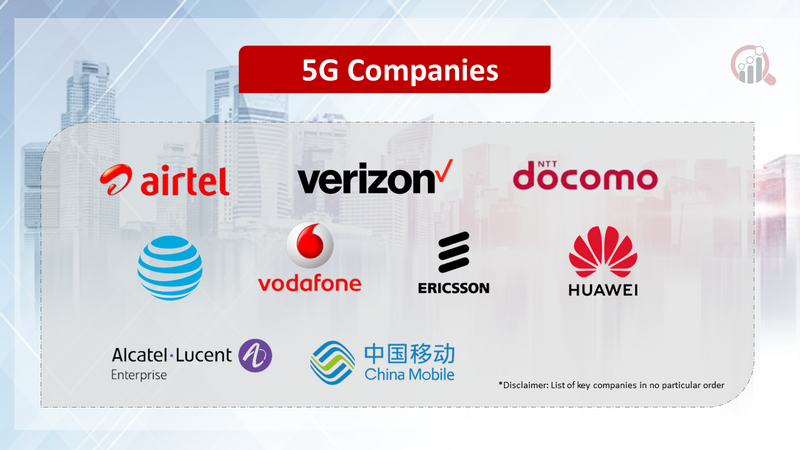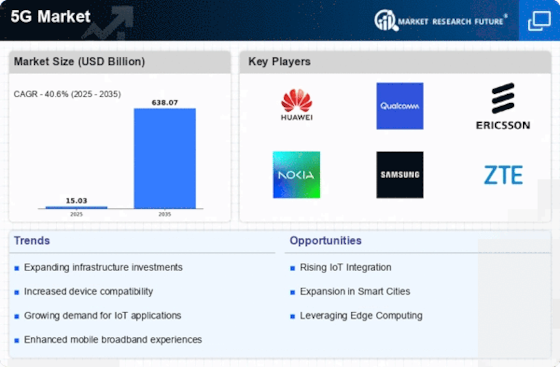Top Industry Leaders in the 5G Market

The Competitive Landscape of the 5G Market
The 5G market is a dynamic and rapidly evolving space, promising a revolution in connectivity and ushering in an era of transformative technologies. Understanding the competitive landscape is crucial for navigating this complex ecosystem. This analysis dives into the key players, their strategies, factors influencing market share, emerging newcomers, and current investment trends.
Key Players:
- Bharti Airtel Limited (India)
- LM Ericsson (Sweden)
- Verizon Wireless (U.S.)
- Vodafone Group PLC (UK)
- AT&T Inc. (U.S.)
- Huawei Technologies Co. Ltd. (China)
- NTT DOCOMO Inc. (Japan)
- Alcatel-Lucent (France)
- China Mobile Ltd. (China)
Strategies Driving Market Share:
- Technology Leadership: Continuous innovation in core 5G technologies, including network slicing, edge computing, and low-latency applications, grants competitive advantages.
- Infrastructure Rollout: Early and extensive deployment of 5G networks across regions secures dominant market positions and attracts customers.
- Strategic Partnerships: Collaborations with technology providers, device manufacturers, and content creators fuel ecosystem development and accelerate market adoption.
- Focus on Verticals: Targeting specific industries like healthcare, manufacturing, and transportation with customized 5G solutions unlocks new revenue streams.
- Cost-efficiency and Affordability: Developing cost-effective solutions and flexible pricing models broadens consumer base and drives market penetration.
Factors Influencing Market Share Analysis:
- Government Regulations: Policy frameworks related to spectrum allocation, network security, and intellectual property rights impact market dynamics.
- Geopolitical Landscape: Trade tensions and national security concerns influence supply chains and technology access, shaping the competitive landscape.
- Technology Standards: Standardization of 5G specifications ensures interoperability and fosters a diverse ecosystem, but ongoing debates influence market share.
- Infrastructure Investment: Capital expenditures required for network deployment and upgrades create barriers to entry for smaller players.
- Consumer Demand: Uptake of 5G smartphones, connected devices, and innovative applications determines the speed and direction of market growth.
New and Emerging Companies:
- Open RAN Startups: Dish Network, Rakuten Mobile, Airspan – challenge established vendors with open source and disaggregated RAN solutions, promoting network flexibility and cost-efficiency.
- Vertical-Specific Players: Amazon Web Services, Microsoft Azure, Google Cloud Platform – leverage their cloud computing expertise to offer 5G-enabled solutions and edge computing services.
- Private Network Providers: Crown Castle, Cellnex, American Tower – build and operate dedicated 5G networks for enterprises and industries, addressing specific connectivity needs.
Current Investment Trends:
- Focus on Network Slicing and Edge Computing: Investments pour into software solutions enabling dynamic network configurations and localized data processing at the network edge.
- Cybersecurity and Network Security: Growing concerns about 5G vulnerabilities drive investments in data protection and threat mitigation technologies.
- IoT and Industrial Automation: Emerging applications in these sectors fuel development of low-latency and high-reliability 5G solutions tailored for industrial environments.
- R&D in 6G Technologies: Leading players are already pouring resources into research and development for the next generation of mobile communication, aiming to maintain technological leadership.
Latest Company Updates:
November 2023- MediaTek, a Taiwanese company that designs chips but outsources manufacturing, on Tuesday introduced the Dimensity 8300 chipset for high-end 5G mobile phones. The chips emphasize AI features, energy efficiency, and connectivity. Phones using the Dimensity 8300 will become available before 2023 ends. The Dimensity 8300 opens up new options for premium smartphones, providing users on-device AI, extremely realistic entertainment experiences, and smooth connectivity without hurting battery life. The chipset has improved Wi-Fi 6E 160 MHz bandwidth performance and simultaneous Wi-Fi/Bluetooth technology.
November 2023- After the successful launch of 5G services by Reliance Jio and Airtel last year (2022), Vodafone Idea has now started rolling out the fastest internet offering in India, joining the club. Users in Delhi and Pune can enjoy high-speed connectivity by using a 5G SIM. Due to issues with slow internet speeds, Vodafone Idea had been rapidly losing customers. The launch of 5G services will reassure and satisfy existing users. To connect to the 5G network, customers need a SIM card that supports 5G.
November 2023- Airtel, one of India's top telecom service providers, has reached a significant achievement with its 5G network. In just a span of one year since rolling out the Airtel 5G Plus, the company has successfully connected over 4.1 million distinct 5G users across Maharashtra, outside of Mumbai. Additionally, Airtel's 5G service is now accessible in all districts and union territories nationwide. Airtel boasts the broadest, fastest and most reliable 5G network spanning all 34 districts in the state.










